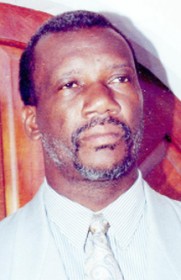-PNC Minister Pat McKenzie disputes claims
Former Minister of Agriculture, Patrick McKenzie has disputed claims that Presidential Advisor Odinga Lumumba acquired land at Akawini and Manarabisi during the PNC administration, saying he has no knowledge of the transactions.

Land acquisitions and related transactions came within McKenzie’s purview during the period October 1986 to December 1992 and in a letter to the press, which was published in yesterday’s edition of this newspaper, he spoke of being unaware of land at either location being given to Lumumba during that period.
Lumumba publicly stated last month that he acquired land at Akawini and Manarabisi during the PNC administration. At that time he had been a senior member of the PNC but later switched to the party headed by Hamilton Green and then to the PPP/C whereupon he was appointed as presidential advisor on empowerment. Lumumba had issued a press statement in which he mentioned the allotments in response to questions about how he managed to acquire land at the back of the Botanical Gardens for a paltry sum. But asked to comment yesterday in the wake of the statement from McKenzie, Lumumba refused. “Stabroek News don’t ever call me again okay, you guys don’t ever call me again!” he roared. Lumumba had previously complained that Stabroek News had not called him before certain stories were published.
General Secretary of the People’s National Congress Reform, Oscar Clarke yesterday noted that the party was in receipt of a correspondence on the issue from McKenzie and according to him, “the party has no reason to dispute what he (McKenzie) is saying”. Clarke said McKenzie was the Minister at the time and “he would certainly know”.
Clarke said the information in the press by McKenzie would clearly reflect the truth of the matter. “He is an honest man and I see no reason why he would not be speaking the truth here. We would not deny anything he has said and would not want to either”, Clarke added.
Stabroek News spoke with another party official on the issue who said McKenzie would be the person to know exactly what had happened during that period of time. “If he said it was so then it was so”, the official said.
In a press statement last month Lumumba said he acquired approximately ten thousand acres of land by lease in 1992 for agricultural purposes at Manarabisi” on the right bank of the Canjie River, Berbice during the PNC administration.
He said too that shortly after the PPP/C administration as-sumed office he was asked to relinquish some 4,000 acres to be made available to the cattle farmers in the area. “By this time I had already expended millions of dollars in surveying, engineering designs and feasibility studies for cultivation of rice and sugar.
Notwithstanding, I willingly agreed to give up the 4,000 acres of land on the sole condition that another plot of land be made available to me”.
This land turned out to be the plot behind the Botanical Gardens which he acquired for $1.5m and later sold for $38m.
With respect to the land at Akawini, Lumumba said then that he had relinquished to the state the rights to 10,000 acres of land at Akawini in the Pomeroon area “which I had acquired under the People’s National Congress (PNC) government”. But in his letter to the press McKenzie said he had no knowledge of the Akawini acquisition. “I am not aware of land in the Akawini that was given to Mr Lumumba, certainly not while I was Minister of Agriculture”, he stated.
On the Manarabisi acquisition, McKenzie said applications and inquiries were received from at least three sources, including a well-known Guyanese rice farming company, for lands for rice cultivation at Manarabisi where there were approximately 40,000 acres available.
He noted that investors needed to have the ability to raise large sums of money because of the large capital investment required, particularly for drainage and irrigation, since there was no basic infrastructural development on the land.
The Manarabisi lands were to be leased for 25 years with the right of renewal provided adequate development works were undertaken, he stated, noting that in addition a major condition of the lease was that water was not to be withdrawn from the Canje Creek because of the danger that posed for salt water entering the sugarcane lands from the lower Canje Creek.
The acreages were large to ensure profitability in keeping with the large capital investment costs and the leases were issued to assist investors in their search for capital funding, he continued, saying “To my knowledge no lessee obtained the required capital for investment prior to the end of 1992 when there was a change of government”.





